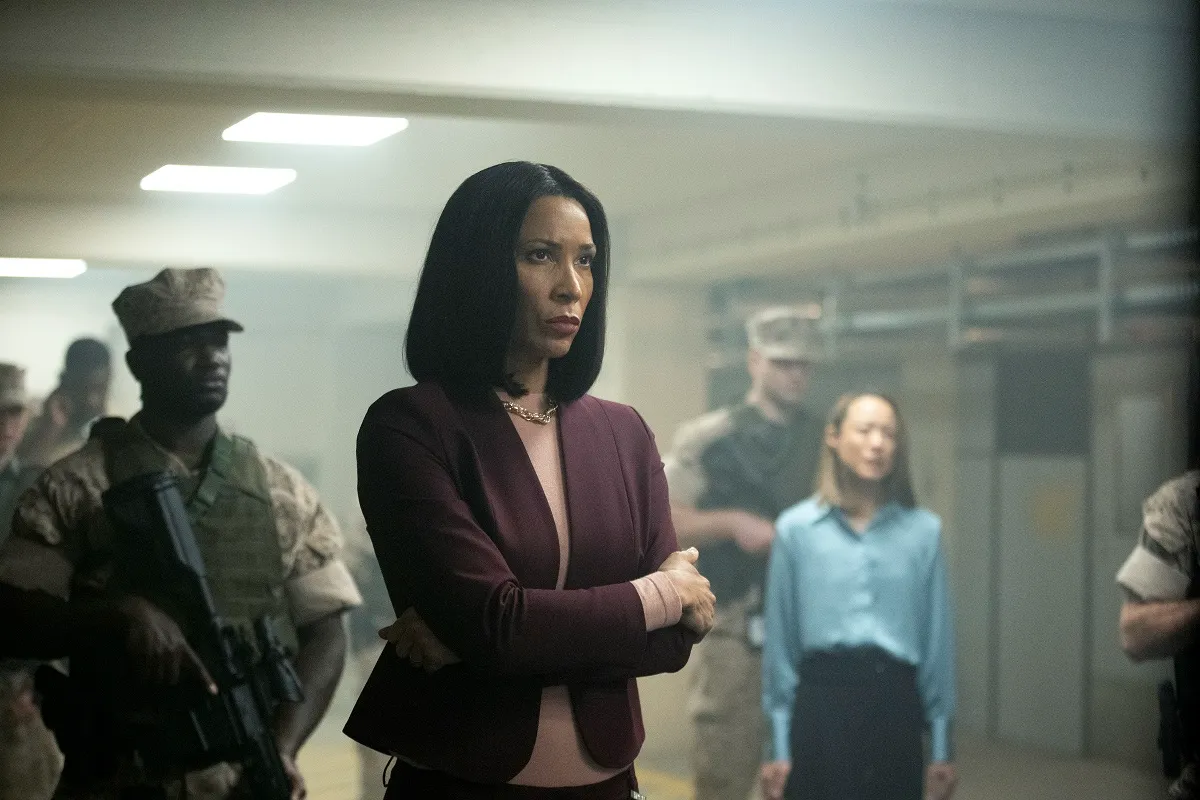Sara’s world collapses under the vaulted ceilings of a German-built U.S. consulate, where her son vanishes as if erased by sovereign decree. In this claustrophobic thriller, every corridor becomes a battleground between maternal instinct and institutional power—a tension born from the collision of German filmmaking’s gritty realism and Hollywood’s sleek, high-stakes spectacle.
An ex-Special Forces soldier haunted by an Afghanistan mission, Sara (Jeanne Goursaud) arrives with six-year-old Josh to secure a work visa—only to discover that within these walls, American law reigns and her own memories can be weaponized against her. Under Christian Zübert’s dual role as writer and director, Exterritorial fuses handheld-camera immediacy with meticulously staged fight choreography, while the setting itself—steel-edged hallways, bilingual signage, security checkpoints—underscores the uneasy idea of “exterritorial” ground.
Co-stars Dougray Scott, Lera Abova, and newcomer Rickson Guy da Silva populate this tense microcosm with loyalty, deception, and the fragile hope of rescue. In probing PTSD, parental devotion, and the notion of physical sovereignty transplanted abroad, the film invites viewers across cultures to question whose laws we trust—and what we’ll sacrifice when they’re weaponized against us.
Mapping the Exterritorial Maze
Sara’s journey begins with a fractured memory of park benches and helicopter blades—a visceral flashback that signals her PTSD more than any spoken line could. A former Special Forces operative, she carries the weight of a fallen comrade from Afghanistan, visible in her tense posture and the physio‐therapy scar on her shoulder. As a single mother racing against time for a U.S. work visa, her backstory fuses a German penchant for psychological realism with Hollywood’s kinetic action ethos, establishing a foundation where emotional trauma and bureaucratic routine collide.
The inciting incident unfolds in the consulate’s play area, where Josh vanishes amid pastel slides and plastic toys while Sara fetches coffee. Here, Zübert leverages cultural contrasts: the efficient, rule‐bound German approach to paperwork clashes with the symbolic claim of American sovereignty within embassy walls. When security footage is edited to expunge Josh’s presence, viewers confront a familiar trope from Eastern European paranoia thrillers—unreliable institutions warping reality. Yet this twist resonates globally, inviting comparisons to video games that erase saved checkpoints to heighten player disorientation.
As tension escalates, Sara debates whether she’s the victim of psychosis or a deeper conspiracy. Her suspicion mirrors a cross‐continental narrative device: the lone hero pitted against a faceless system, found in both Nordic noir and blockbuster franchises.
Into this crucible steps Irina, a fellow captive hidden in a silent wing. Their alliance mimics cooperative gameplay mechanics, relying on trust tokens exchanged for map access through locked corridors and secure checkpoints. Meanwhile, skeptical Marines like Donovan patrol corridors as aggro NPCs, forcing Sara into branching paths that test her moral and tactical choices.
The climactic thrust channels high‐wire chase sequences through skylights and over rooftops, where each leap feels like a level completed under pressure. By reentering the embassy’s inner sanctum—once deemed untouchable—Sara defies both legal and cinematic boundaries. Scenes of her scaling walls recall the fluid combat of samurai cinema, while the claustrophobic architecture evokes classic Cold War set pieces. As she infiltrates the heart of exterritorial authority, the film asks whether survival hinges on silencing anxiety—or harnessing it against an indifferent system.
Embodied Allegiance: Characters Across Borders
Jeanne Goursaud’s Sara embodies a fusion of German introspection and global action‐hero tropes: she shifts from a watchful mother—captured in lingering close-ups reminiscent of New German Cinema—to a disciplined warrior whose every strike recalls the precision of Eastern martial‐arts choreography. Her physical arc mirrors narrative beats in survival games, where a character’s skill tree unlocks under pressure, and her emotional journey—from startled panic to dogged resolve—speaks to cross-cultural ideals of maternal sacrifice and individual agency.
Young Josh, though mostly off-screen, functions like a “lost quest” in an open-world title: his absence drives every branching path Sara takes. The camera’s framing—empty swings, tilted angles on discarded toys—creates a visual gap that echoes gameplay “ghost markers,” haunting both Sara’s guilt and the audience’s search instinct.
Dougray Scott’s Erik Kynch channels bureaucratic detachment common in European political thrillers while wearing the polished restraint of a corporate antagonist in AAA games. His measured delivery and tight posture generate the same uneasy suspense you’d feel confronting an NPC whose dialogue options conceal hidden motives.
Lera Abova’s Irina arrives as a fragile ally, echoing the reluctant sidekick archetype from JRPGs whose backstory quests enrich the main campaign. Their uneasy pact layers emotional stakes onto the film’s tactical maneuvers.
Even minor figures—Marines glancing at paperwork, consulate clerks repeating stock reassurances—play the roles of scripted obstacles or random encounters, reinforcing a thematic undercurrent: in a space governed by law yet unbound by geography, whom can you believe?
Kinetic Diplomacy: Action as Cultural Expression
Sara’s unarmed confrontations unfold like a transnational dialogue, fusing German arthouse verisimilitude with the visceral clarity of East Asian martial arts cinema. Her MMA-inspired arsenal—rapid elbows in confined corridors, a grounded chokehold amid plastic play structures—reflects Berlin’s growing mixed-combat scene while nodding to cinematic legacies from Hong Kong to Scandinavia. Each sudden strike against walls or the metal frame of a child’s slide underscores how environment becomes an improvised weapon, much like a level-design puzzle in a global stealth-action title.
Zübert’s devotion to long takes—a breathless, unbroken hallway sequence followed by a staircase skirmish—echoes the one-shot ethos of European new-wave thrillers and the “oner” philosophy in modern blockbusters. By resisting rapid edits, these scenes spotlight Goursaud’s physical commitment and invite viewers to inhabit each brutal rhythm. This technique resonates with gamers accustomed to on-rails challenges, where uninterrupted runs heighten tension and reward mastery.
The film’s varied set pieces—rooftop leaps over architectural ledges, the skylight drop into a shadowy basement—contrast wide-open play zones against claustrophobic offices. These shifts mirror level design in open-world games, where freedom alternates with choke points testing player resourcefulness. Early encounters feel grounded: a scar-reveal punch and a pill-pop moment root the action in personal trauma. Later sequences turn wilder—a toilet-lid bludgeon channeling genre-defying bravado—pushing plausibility but sustaining emotional momentum.
Throughout, fight pacing aligns with Sara’s fractured psyche. Her sudden flurries of strikes mirror PTSD’s jarring intrusions, while calmer lulls reveal survival instincts honed by military rigor. As action propels plot stakes—each blocked exit or broken window heightening desperation—the choreography becomes a cross-cultural lexicon, asking whether violence can bridge or widen the gap between personal history and global power structures.
Framing Sovereignty: Cinematic Design and Sonic Topography
Zübert’s handheld camera work channels a German documentary tradition—unsteady, intimate, insistently close—while evoking the first-person perspective of stealth-action games. Tight framing in narrow corridors amplifies anxiety, much like limited camera angles in survival-horror titles that trap players in claustrophobic maps. The color scheme reinforces this split identity: the consulate’s cool grays and antiseptic blues recall bureaucratic efficiency, whereas sun-warmed flashbacks bloom in sepia-tinged golds, marking memory as a sanctuary outside exterritorial constraint.
Editing oscillates between kinetic economy and psychological jolts. Sparse cuts during hand-to-hand brawls mimic uninterrupted combat sequences in AAA titles, heightening immersion, while brisk montages of Sara’s workouts and visa queues mirror tutorial levels that prepare players for core mechanics. Occasional jump cuts—snapping to empty hallways or a lone security badge—gesture toward dissociative gameplay moments, where the map shifts beneath your feet.
Sound design acts as an audio level-design masterstroke. Echoing footsteps in sterile halls function like enemy-proximity cues, and distant rotor blades trigger memory-flashback triggers akin to environmental storytelling in open-world games. A restrained percussion score underpins tension, while abrupt silences—cutting music mid-beat—play like suspenseful audio stingers in stealth missions, forcing audiences to lean in.
Production design casts the U.S. consulate as a labyrinthine dungeon: barcode-scanned doors become locked gates, and bilingual signage (English/German) marks safe zones versus hostile territory. Fluorescent overheads glare down on fluorescent-lit offices, while dim back corridors feel like optional side areas ripe for exploration. Spotlights on Sara’s scar, her pill bottle, and an abandoned swing serve as interactive waypoints, guiding our focus much as quest markers do in role-playing games—reminding us that in this space, every detail carries jurisdictional and emotional weight.
Between Trauma and Territory
Sara’s PTSD pulses like an internal game timer, her helicopter-triggered trance and daily pill ritual externalized in tight close-ups that mirror character status bars draining under stress. This physical echo of trauma collides with an elemental maternal instinct—every protective strike and frantic search sequence becomes a quantifiable drive metric, where her health bar regenerates only through retrieving Josh.
The film’s gaslighting motif—security footage that “erases” Josh—echoes unreliable save states in experimental indie games, forcing viewers to question whether Sara’s perspective is authoritative or corrupted. Here, institutional authority plays the role of an opaque AI, adjudicating reality with cold logic that entraps rather than assists.
Underpinning this is the “exterritorial” premise: American law imposed in German space, a concept that resonates with global players navigating region-locked content. Jurisdiction becomes narrative fuel, inviting comparisons to geopolitical strategy titles where border rules shift mid-campaign.
Tonally, Exterritorial pivots from simmering thriller to unrestrained action—a transition as stark as shifting from a stealth mission to an arena brawl. Early visa-line sequences and pill-focused beats build a steady foundational rhythm, while mid-film betrayals accelerate into breakneck combat. The final act races toward resolution like a time-sensitive raid, testing whether the film’s escalating pace maintains coherence or overloads its thematic servers, and prompting us to ask: where does authority end and personal sovereignty begin?
Final Assessment
Goursaud’s steely presence anchors a film that marries German psychological grit with Hollywood’s uninterrupted, one-take fight sequences, delivering an emotionally charged premise and visceral action. Yet plot conveniences—like the implausible toilet-lid beat-down—and a handful of sidelined characters sometimes strain credibility.
Viewers drawn to tight conspiracies, athletic choreography, and a claustrophobic setting will find much to admire, especially those attuned to how international filmmaking vocabularies collide.
Exterritorial doesn’t reinvent the genre, but its cross-cultural synthesis of trauma narrative and kinetic spectacle leaves open the question: can suspense ever truly transcend the borders we build around it?
Full Credits
Director: Christian Zübert
Writers: Christian Zübert
Producers: Kerstin Schmidbauer, Franziska Suppee, Verena Vogl, Götz Marx
Executive Producers: Oliver Berben
Cast: Jeanne Goursaud, Dougray Scott, Lera Abova, Kayode Akinyemi, Annabelle Mandeng, Rickson Guy Da Silva, Rada Rae, Tayo Schaffrath, Kris Saddler, Nina Liu
Director of Photography (Cinematographer): Matthias Pötsch
Editors: Ueli Christen
Composer: Sara Barone
The Review
Exterritorial
Exterritorial delivers taut suspense and visceral action anchored by Goursaud’s compelling turn, even as late-act contrivances tug at its realism. The claustrophobic setting and one-take fight scenes generate relentless intensity, making it a solid thriller worth streaming.
PROS
- Jeanne Goursaud’s intense, committed lead turn
- Impressive one-take action sequences that spotlight performer skill
- Claustrophobic setting that heightens suspense
- Interplay of psychological and physical stakes
- Engaging cross-cultural premise
CONS
- Late-act plot contrivances occasionally strain credibility
- Momentary suspension-of-disbelief breaches in extreme violence
- Underutilized supporting characters
- Uneven tonal shifts between thriller and action





















































